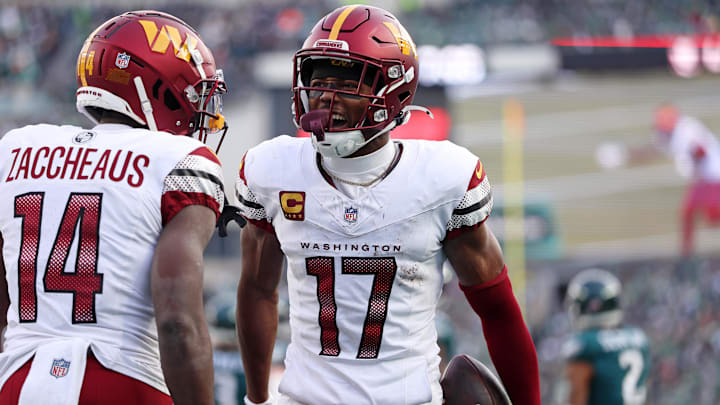Terry McLaurin turns 30 years old on September 15, and it seems that simple fact is preventing him from signing a contract extension with the Washington Commanders. The former Ohio State star has been the franchise’s leading receiver in each of his six seasons since he became a third-round selection in 2019.
McLaurin is heading into the final year of his contract with Washington and has been holding in throughout training camp in hopes of getting a deal done, and has even requested a trade to increase the pressure on the only NFL franchise he has ever called home. And it hasn’t always been the most stable home for the former Buckeye.
In a stretch that has included three different team names and 11 different starting quarterbacks, McLaurin has been one of the only constants in D.C., yet after another 1,000-receiving-yard season and a career-high 13 touchdown catches from rookie phenom Jayden Daniels in 2024, McLaurin and Commanders’ general manager Adam Peters appear to be at an impasse.
The Commanders are perfectly situated to pay Terry McLaurin
The 2011 NFL Collective Bargaining Agreement ushered in the greatest competitive advantage in the history of the sport, the rookie contract scale. Since 2011, rookies have been slotted into a pay bracket pre-determined by their draft slot, with up to five years of contractual control for first-round selections on the initial contract.
That CBA unintentionally created the “rookie QB window,” as it has come to be known. The window opens when a team drafts a quarterback, typically in the first round, and if that player proves to be capable early in their career, they immediately become one of the most valuable assets in the entire NFL because while other elite QBs are making over $60 million a year, they are cost-controlled. Even the No. 1 overall pick hardly hits the salary cap for over $10 million a season by the end of the deal.
Washington in that window with Daniels, the second-overall selection in the 2024 NFL Draft, and that’s the perfect time to spend big on a wide receiver, even one who is aging. The modern NFL has proven that it’s difficult – unless you’re the Cincinnati Bengals and are willing to completely sacrifice the idea of defense – to pay both an elite QB and an elite wide receiver. The Chiefs eventually had to trade Tyreek Hill, and the Bills had to move on from Stefon Diggs.
So, while Daniels is cheap, Washington should ensure that he has as many weapons as possible to lead the franchise back to the NFC Championship game and potentially beyond. Daniels already got their with McLaurin, it’d be foolish not to see what he can do with him back in Year 2, especially considering the other pass-catchers on the roster.
It’s not like Peters has assembled an embarrassment of riches at wide receiver in Washington. He acquired Deebo Samuel from San Francisco this offseason, but he’ll turn 30 this season as well and has been more injury-prone than McLaurin.
McLaurin is the only true dominant outside WR on the roster in Washington. If he begins to fade in the latter years of his contract, that’s a small price to pay to equip your elite second-year QB with a wide receiver of his caliber this season.
